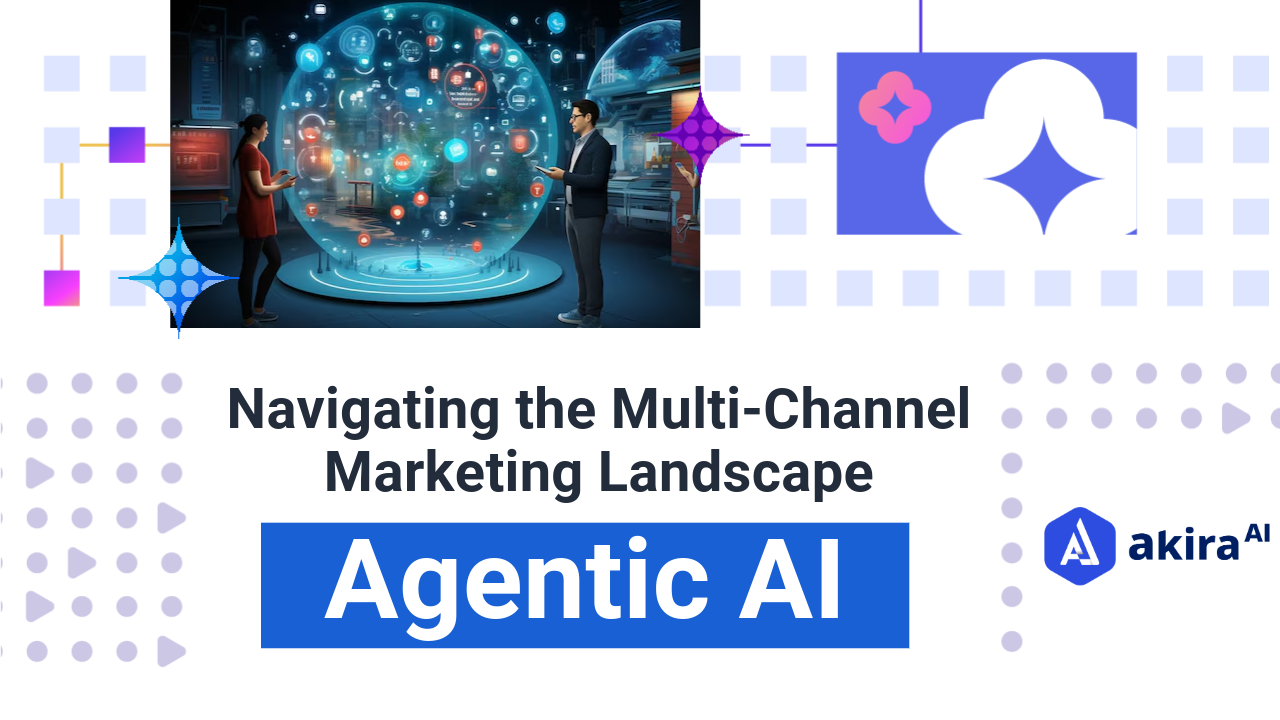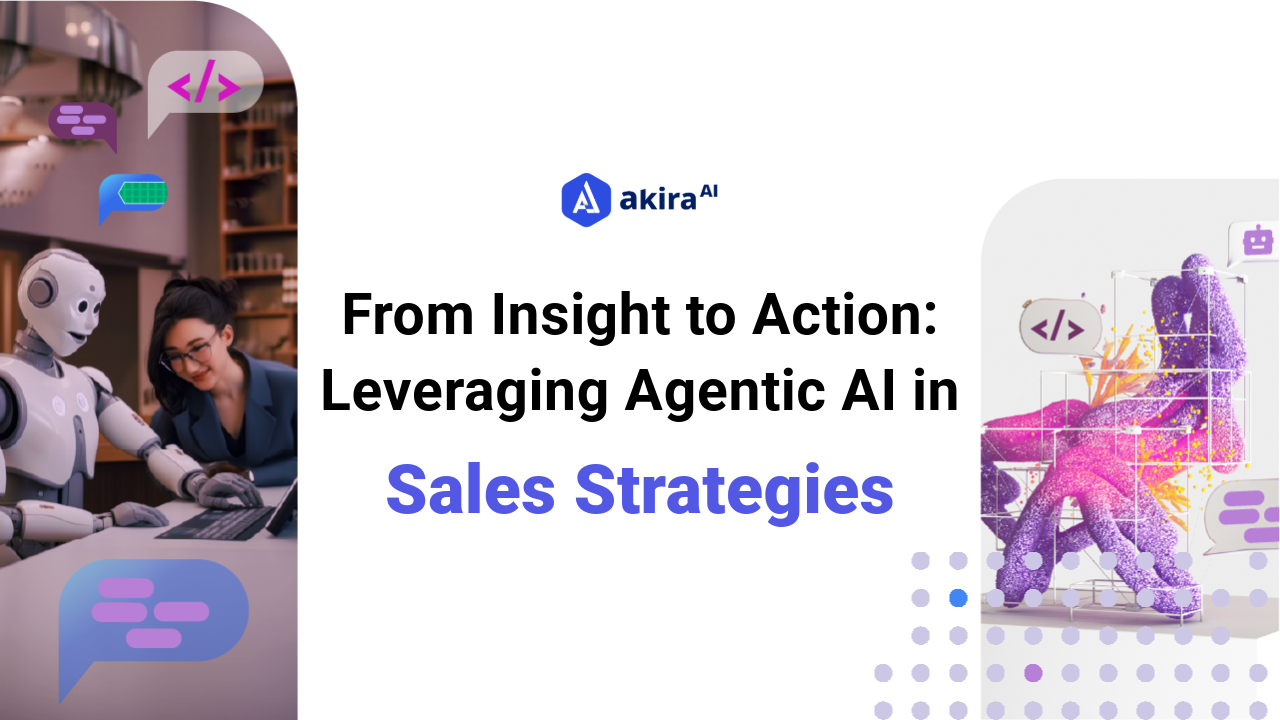Key Insights
Agentic AI and Agentic Workflow are transforming multi-channel marketing by automating key tasks like audience segmentation, content creation, and campaign management. These intelligent systems use real-time data to make dynamic adjustments, ensuring more personalized and efficient campaigns. Compared to traditional methods, agentic AI boosts engagement, improves conversion rates, and enhances overall marketing effectiveness. This shift empowers businesses with smarter, data-driven strategies across all marketing channels.

In this increasingly digital world, over the last few years, multi-channel marketing has been the sole cornerstone of sales strategies. AI agents harnessed for campaigns would provide better efficiency, targeting, and scalability solutions for the large spectrum of customer-marketing relationships. From boosting customer engagement to customizing interactions, AI-driven multi-channel marketing campaigns might just change how businesses communicate and grow with their customers.
This blog explores the transformative role of AI agents in sales-driven multi-channel marketing - its benefits, use cases, and the technology behind these solutions.
Multi-Channel Marketing Campaigns
Multi-channel marketing campaigns engage customers across platforms like social media, email, websites, and mobile apps, providing a seamless experience regardless of where interactions occur. These campaigns help sales teams reach diverse audiences, nurture leads and boost conversions by tailoring messaging for each platform while ensuring cohesive customer journeys toward a sale.
The Rise of AI Agents in Multi-Channel Marketing
AI Agents are advanced systems designed to automate tasks, analyze large volumes of data, and make real-time decisions with minimal human input. These agents continuously learn and adapt, optimizing processes across various domains. By bypassing manual involvement, they can execute tasks more efficiently and at a larger scale, driving automation across industries. Their ability to learn from data and make informed decisions ensures precision in operations while freeing teams from repetitive tasks.
In multi-channel marketing, these agents play a crucial role in enhancing campaign performance. They automate key processes like content personalization, audience segmentation, and message optimization. By constantly analyzing customer behavior across all channels—email, social media, websites, and more—these agents make real-time adjustments, ensuring that messages are timely and relevant. This not only boosts engagement but also makes campaigns more targeted, consistent, and efficient, leading to better overall results and higher conversion rates.
Comparison of Traditional Solution Vs Agentic AI Solution
|
Aspect |
Traditional Practices |
Agentic AI Solutions |
|
Management |
Manual management of campaigns |
Automated campaign management |
|
Audience Segmentation |
Static audience segmentation |
Dynamic, real-time audience segmentation |
|
Message Crafting |
Manual crafting of messages for each platform |
Automated content personalization based on real-time data |
|
Performance Monitoring |
Time-consuming, prone to human error |
Real-time analysis and adjustments |
|
Data Handling |
Struggles with large volumes of data |
Efficient data gathering and analysis across channels |
|
Efficiency |
Often inefficient due to manual processes |
Increased campaign efficiency through automation |
|
Personalization |
Limited personalization based on static segments |
Scalable personalization tailored to individual preferences |
How Do AI Agents Advance Multi-channel Marketing Campaigns?
AI agents improve multi-channel campaigns with the following effects:
-
Data-Driven Personalization: These agents analyze a huge volume of customer data where marketers can personalize content, offers, or even messaging in real-time according to preference. This will add greater engagement towards the customers and higher conversion rates.
-
Real-Time Decision Making: Intelligent agents can monitor campaign performance in real time and adjust strategies to enhance engagement. For instance, they can reschedule an email campaign to align with user behavior trends or redirect resources to channels that are under-performing.
-
Optimized Customer Journey: The autonomous agents will track customer interaction across multiple channels so that consistency and a coherent message is coming out from marketing. Thus, AI will find out where the customer is on his journey and do appropriate messaging.
-
Automation of Repetitive Tasks: Sending emails to responding to social media messages regarding queries from the customers, these agents perform repetitive marketing jobs that help channel human marketers' strategy and creativity.
Multi-Agent Action: Transforming Campaigns with Akira AI
The structured approach of multi-agent action of Akira AI helps smoothen the marketing process with campaigns becoming both data-driven and adaptive, which not only spells improvement in customer engagement but also yields overall improvement in business performance.
 Fig 1: Technical Architecture Diagram of Autonomous Multi-Channel Marketing
Fig 1: Technical Architecture Diagram of Autonomous Multi-Channel Marketing
-
Data Integration and Insights Generation
In this connection, Data Integration Agent leverages everything it can within agentic AI and real-time brings in actual customer data sourced from multiple CRM systems like HubSpot, Zoho Drive, Nutshell, Close, and Pipedrive. This agent continues aggregating and updating the data so that each succeeding action can be made on the latest insight. It creates a bed for eventual campaign success.
-
Dynamic Audience Segmentation
Using agentic workflows, the Audience Segmentation Agent creates dynamic targeted customer-specific segments from the integrated data. With this, the power of the ML algorithm can now be utilized in discovering patterns and preference structures that may prove helpful in creating customized groups of audiences. Dynamic relevance would ensure real-time changes in the data affecting campaign performances, thus making the users personalized and engaging.
-
Automated Content Generation
AI Agent designs craft messages for each marketing channel-whatever this might be an e-mail, a social-media ad, or a search engine ad. It automatically generates content and checks that created content speaks to each defined earlier audience segment-this is how the message is optimized to be most persuasive, maximized per platform.
-
Campaign Management and Activations
The Campaign Management Agent is charged with scheduling and running campaigns through channels. It makes use of workflows that are agentic to ensure that its campaigns are going up at the right times and are being monitored in real-time, thereby facilitating coordination of all the agents working together with the task of creating consistency and efficiency across all platforms.
-
Performance Monitoring and Improvement
Finally, with the assistance of agentic AI, analytics & reporting could monitor the real-time performance of campaigns. Information is ingested for KPIs that yield insight and may even inform strategy, and it is forwarded accordingly however, bringing in a Human Review Loop would ensure at a minimum periodically that content items were reviewed for fit on brand but would instead yield speed at the expense of analytics.
Use Cases of AI Agents in a Multi-channel Marketing Campaign
1. Email Marketing Optimization: AI agents analyze open rates, click-through rates, and conversion rates and optimize the content and the timing for sending it to create higher engagement.2. Social media engagement: Auonomous agents will automatically track any social media channel, answer customer queries, write content, and even discover trending topics for engagement by brands.
3. Dynamic Content Creation: These agents can be used even to create dynamic content-that is, customized, dynamic forms that change based on user behavior-for example, product recommendations on an e-commerce website change according to each person's preference.
4. Ad targeting and Bidding: The agents will analyze data appropriately to place the ads for real-time optimizations on the Google Ad platform while having regards to its social media campaigns and its strategy on bidding.
5. Customer Retargeting: Intelligent agents may even retarget the customer based on actual behavior and can use personalized offers or content on earlier interactions that could improve conversion chances.
Benefits of AI Agents in Multi-channel Marketing Campaigns
-
Time Management
By automating routine marketing tasks, Akira AI’s platform significantly reduces the time spent on manual processes by up to 70%. This allows marketing teams to redirect their efforts toward strategic planning, creative initiatives, and other high-impact activities that drive business growth.
- Enhanced Engagement
These agents increase engagement upto 60% using the most advanced targeting techniques combined with automatic creation. They understand customer data and behavior, therefore, are in a position to craft messages that speak individually to audience segments.
-
Real-Time Insights
Analytics & Reporting Agent from Akira AI gives real-time data and performance reporting; so marketing teams are able to make rapid decisions. Real-time access to the insight enables rapid campaign fine-tuning; so strategies do not get out of phase with current trends and behaviors of its customers.
- High Conversion Rate
This will increase the conversion rates because the right message is fed into the varied channels for the email campaign, search engine campaign, or social media campaign. Bringing the right message to the right audience at the right time is what Akira AI aims to encourage customer action toward conversion.
-
Operational Control
The integration of the Human Review Loop into the workflow ensures such high-level decisions are under its control but brings brand consistency without burdening marketing teams with daily operation-related tasks.
Future Trends of Agentic AI In Multichannel Campaigns
The future for AI in multi-channel marketing campaigns looks bright, forward looking, with continuous progress from AI technologies at the forefront of what becomes possible. And here's how:
-
More Advanced Personalization: Autonomous agents will be much more effective in understanding an individual customer's preference and can hence provide hyper-targeted content and experiences.
-
Integration with Voice and Visual Search: With such a revolutionary agentic AI advancement, voice, and visual search would play the most gigantic role in multi-channel marketing, and brands could reach new levels of customer acquisition unprecedentedly.
-
Advanced customer insights: Agents will provide marketers with deeper insights regarding actual customer behavior; hence the marketer can predict long-term trends and develop forward-thinking strategies.
-
Increased Automation: This will deal with marketing's complicated tasks. Here, It will be engaged in more sophisticated campaigning and optimization roles.
-
Ethical Agentic AI Marketing: Ethical issues related to data privacy and transparency are going to drive the sense of responsibility in AI marketing practices as AI gradually finds out its practical usage in marketing.
Conclusion: AI Agents for Multi-Channel Marketing
AI agents are revolutionizing multi-channel marketing campaigns with unprecedented efficiency, personalization, and insights. Real-time optimization of campaigns, while automating recurring tasks, thus puts marketers in a better position than before to deliver more impactful, data-driven strategies. The future of multi-channel marketing campaigns seems brighter with even more capabilities up ahead as AI technology continues to advance. This way, it tends to focus around the agentic platform of Akira AI to bestow the current level of power that businesses need to achieve within a modern marketing competition.

